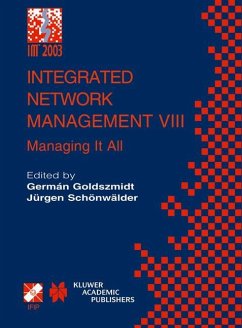This volume contains the proceedings of the Eighth IFIP/IEEE International Symposium on Integrated Network Management (IM 2003), which was jointly sponsored by the International Federation for Information Processing (IFIP) and the IEEE Communications Society. The conference convened in Colorado Springs, Colorado, USA in March 2003. With contributions from researchers and practitioners from Europe, America and Asia, this volume provides a comprehensive snapshot of the current state of the art in network and systems management.
Welcome to 1M 2003, the eighth in a series of the premier international technical conference in this field. As IT management has become mission critical to the economies of the developed world, our technical program has grown in relevance, strength and quality. Over the next few years, leading IT organizations will gradually move from identifying infrastructure problems to providing business services via automated, intelligent management systems. To be successful, these future management systems must provide global scalability, for instance, to support Grid computing and large numbers of pervasive devices. In Grid environments, organizations can pool desktops and servers, dynamically creating a virtual environment with huge processing power, and new management challenges. As the number, type, and criticality of devices connected to the Internet grows, new innovative solutions are required to address this unprecedented scale and management complexity. The growing penetration of technologies, such as WLANs, introduces new management challenges, particularly for performance and security. Management systems must also support the management of business processes and their supporting technology infrastructure as integrated entities. They will need to significantly reduce the amount of adventitious, bootless data thrown at consoles, delivering instead a cogent view of the system state, while leaving the handling of lower level events to self-managed, multifarious systems and devices. There is a new emphasis on "autonomic" computing, building systems that can perform routine tasks without administrator intervention and take prescient actions to rapidly recover from potential software or hardware failures.
Welcome to 1M 2003, the eighth in a series of the premier international technical conference in this field. As IT management has become mission critical to the economies of the developed world, our technical program has grown in relevance, strength and quality. Over the next few years, leading IT organizations will gradually move from identifying infrastructure problems to providing business services via automated, intelligent management systems. To be successful, these future management systems must provide global scalability, for instance, to support Grid computing and large numbers of pervasive devices. In Grid environments, organizations can pool desktops and servers, dynamically creating a virtual environment with huge processing power, and new management challenges. As the number, type, and criticality of devices connected to the Internet grows, new innovative solutions are required to address this unprecedented scale and management complexity. The growing penetration of technologies, such as WLANs, introduces new management challenges, particularly for performance and security. Management systems must also support the management of business processes and their supporting technology infrastructure as integrated entities. They will need to significantly reduce the amount of adventitious, bootless data thrown at consoles, delivering instead a cogent view of the system state, while leaving the handling of lower level events to self-managed, multifarious systems and devices. There is a new emphasis on "autonomic" computing, building systems that can perform routine tasks without administrator intervention and take prescient actions to rapidly recover from potential software or hardware failures.








